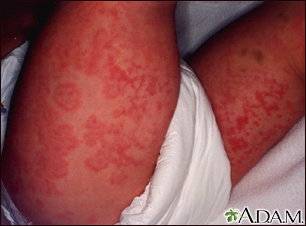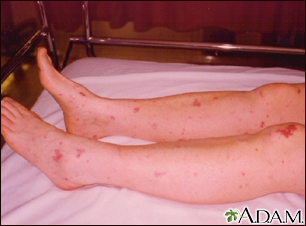Purpura
Blood spots; Skin hemorrhages
Purpura is purple-colored spots and patches that occur on the skin, and in mucus membranes, including the lining of the mouth.
Images









I Would Like to Learn About:
Considerations
Purpura occurs when small blood vessels leak blood under the skin.
Purpura measure between 4 and 10 mm (millimeters) in diameter. When purpura spots are less than 4 mm in diameter, they are called petechiae. Purpura spots larger than 1 cm (centimeter) are called ecchymoses.
Platelets help the blood clot. A person with purpura may have a normal platelet count (non-thrombocytopenic purpuras) or a low platelet counts (thrombocytopenic purpuras).
Causes
Non-thrombocytopenic purpuras may be due to:
- Amyloidosis (disorder in which abnormal proteins build up in tissues and organs)
- Blood clotting disorders
- Congenital cytomegalovirus (condition in which an infant is infected with a virus called cytomegalovirus before birth)
- Congenital rubella syndrome
- Drugs that affect platelet function or clotting factors
- Fragile blood vessels seen in older people (senile purpura)
- Hemangioma (abnormal buildup of blood vessels in the skin or internal organs)
- Inflammation of the blood vessels (vasculitis), such as Henoch-Schönlein purpura, which causes a raised type of purpura
- Pressure changes that occur during vaginal childbirth
- Scurvy (vitamin C deficiency)
- Steroid use
- Certain infections
- Injury
Thrombocytopenic purpura may be due to:
- Drugs that reduce the platelet count
- Idiopathic thrombocytopenic purpura (ITP) -- a bleeding disorder
- Immune neonatal thrombocytopenia (can occur in infants whose mothers have ITP)
- Meningococcemia (bloodstream infection)
When to Contact a Medical Professional
Call your health care provider for an appointment if you have signs of purpura.
What to Expect at Your Office Visit
The provider will examine your skin and ask about your medical history and symptoms, including:
- Is this the first time you have had such spots?
- When did they develop?
- What color are they?
- Do they look like bruises?
- What medicines do you take?
- What other medical problems have you had?
- Does anyone in your family have similar spots?
- What other symptoms do you have?
A skin biopsy may be done. Blood and urine tests may be ordered to determine the cause of the purpura.
Related Information
Bleeding into the skinPlatelet count
References
Dinulos JGH. Principles of diagnosis and anatomy. In: Dinulos JGH, ed. Habif's Clinical Dermatology. 7th ed. Philadelphia, PA: Elsevier; 2021:chap 1.
Kitchens CS. Purpura and other hematovascular disorders. In: Kitchens CS, Kessler CM, Konkle BA, Streiff MB, Garcia DA, eds. Consultative Hemostasis and Thrombosis. 4th ed. Philadelphia, PA: Elsevier; 2019:chap 10.
BACK TO TOPReview Date: 6/7/2023
Reviewed By: Elika Hoss, MD, Assistant Professor of Dermatology, Mayo Clinic, Scottsdale, AZ. Also reviewed by David C. Dugdale, MD, Medical Director, Brenda Conaway, Editorial Director, and the A.D.A.M. Editorial team.

Health Content Provider
06/01/2025
|
A.D.A.M., Inc. is accredited by URAC, for Health Content Provider (www.urac.org). URAC's accreditation program is an independent audit to verify that A.D.A.M. follows rigorous standards of quality and accountability. A.D.A.M. is among the first to achieve this important distinction for online health information and services. Learn more about A.D.A.M.'s editorial policy, editorial process and privacy policy. A.D.A.M. is also a founding member of Hi-Ethics. This site complied with the HONcode standard for trustworthy health information from 1995 to 2022, after which HON (Health On the Net, a not-for-profit organization that promoted transparent and reliable health information online) was discontinued. |
The information provided herein should not be used during any medical emergency or for the diagnosis or treatment of any medical condition. A licensed medical professional should be consulted for diagnosis and treatment of any and all medical conditions. Links to other sites are provided for information only -- they do not constitute endorsements of those other sites. © 1997- 2025 A.D.A.M., a business unit of Ebix, Inc. Any duplication or distribution of the information contained herein is strictly prohibited.
